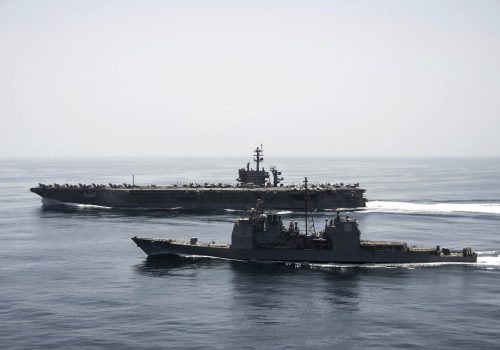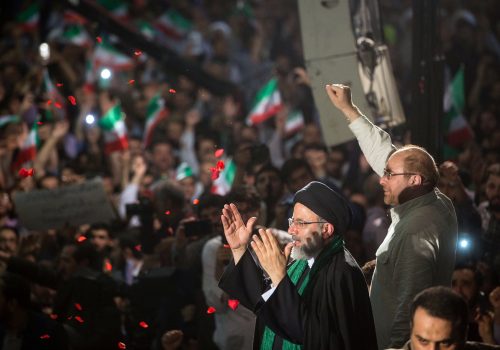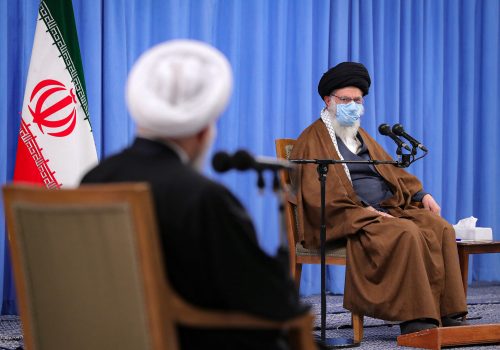Why Iran will not let Arab states join nuclear talks
When French President Emmanuel Macron said in late January that any talks to revive the Iran nuclear deal should include Saudi Arabia, it was not the first time that some of the Arab countries of the Persian Gulf were mentioned in this context. In 2014 and 2015, Saudi Arabia and the United Arab Emirates (UAE) demanded to be directly involved, prompting a negative reaction from Tehran and some world powers. However, Macron’s comment was the first time that a Western country that took part in the 2015 deal pushed for Arab participation.
Iran reacted very quickly and negatively to the French president’s remarks. In an interview with Al Arabiya television on January 29, Iranian Foreign Ministry spokesman Saeed Khatibzadeh said the 2015 Joint Comprehensive Plan of Action (JCPOA) “is a multilateral international agreement ratified by Security Council Resolution 2231, and is by no means re-negotiable and the parties to it are clear and unchangeable.”
A few days later, President Hassan Rouhani underlined this, saying “No clause of the JCPOA will change and no person will be added to the JCPOA… The JCPOA will remain as it is, and there is a UN Security Council document attached to it for the worse or better.” The agreement was negotiated by Iran with the five permanent members of the UN Security Council—the United States, Britain, France, China, and Russia plus Germany—known as the P5+1.
Iran’s opposition to including Arab states in potential new nuclear talks, while based on legal precedent, also has political and security dimensions.
Incorporating members of the Gulf Cooperation Council (GCC) in new talks would mean creating a new regional front and the likelihood that non-nuclear demands would be raised, such as limiting Iran’s military capabilities or its regional interventions. In addition, accepting the participation of Persian Gulf Arab states would mean recognizing Saudi concerns about Iran’s nuclear and ballistic missile program while ignoring Iran’s own regional concerns, like the potential threats posed by the US—via its military bases in the region—and by Israel. Iran argues that its missile program is defense-oriented while Saudi Arabia and its allies see Iran’s ballistic missiles as a threat to its neighbors.
Iran’s concerns have been amplified by the Abraham Accords, under which the UAE and Bahrain normalized relations with Israel. “From now on, we will hold the UAE and Bahrain responsible for anything that happens in the Persian Gulf that harms our national interests,” Mohammad Bagheri, the chief of staff of the Iranian Armed Forces, said on September 26, 2020 after the accords were signed in Washington.
The anxiety Israel has been experiencing due to the presence of Iran-backed militias on its border with Syria is similar to the worries Iran has in regard to Israel possibly opening a new front with Iran through the UAE. The Abraham Accords mark a shift in regional concern from Israel to the perception of Iran as the greater threat. To Iran, the participation of GCC member countries in the talks would mean the formation of an alliance with the Israel and the US against Iran—something the Trump administration had also sought through its failed Middle East Security Alliance (MESA).
Saudi Arabia has already contributed to the perception of an anti-Iran front by cooperating with the US to increase oil production so that the removal of Iranian oil from world markets would not increase prices. However, intra-GCC quarrels between Saudi Arabia, the UAE, Bahrain, and Qatar, plus the concerns of Kuwait and Oman about being dragged into an anti-Iran alliance, has prevented MESA from coming to fruition.
Iran would be open to regional talks that exclude foreign powers. The Islamic Republic’s foreign and regional policy doctrine—especially since the 2003 US invasion of Iraq—has always stressed the need for international powers—such as the United States and Russia—to not only stay out of regional affairs but to exit from the Middle East, particularly from the Persian Gulf region. Iran has often reminded Persian Gulf Arab countries that security cannot be bought from beyond the region and that peace, stability, and security will not be achieved unless regional talks are held. At the same time, Iran welcomed Russian help in saving the Bashar al-Assad regime in Syria, defending this stance as supporting an existing regime against foreign-backed threats. Iran has invited countries, including Saudi Arabia and its allies, for discussions on security issues. In 2019, for example, Iran and the UAE held talks over maritime security in Persian Gulf after a series of attacks on oil tankers
The main impediment to Tehran-Riyadh dialogue is rooted in Saudi concerns that the balance of power among regional actors had shifted in Iran’s favor after the fall of Saddam Hussein in 2003. Saudi Arabia doesn’t seem inclined to join direct talks with Iran while Tehran is perceived as more influential. Rather, Saudi Arabia would prefer to sit at the negotiation table with a superpower by its side.
Iran will continue to seek to resolve tensions with Arab countries in the Middle East within the framework of regional mechanisms, but will neither assign a greater role for its neighbors nor accept Arab participate in negotiations on Iran’s nuclear program. Even this willingness to engage in a regional context may evaporate once the Rouhani government is gone. If hardliners win the June presidential election, as many anticipate, they will probably prefer to bolster alliances with regional partners, such as militant group Hezbollah, Shia militias in Iraq, and Houthi rebels, rather than seek de-escalation with rivals.
Saeid Jafari is a Middle East analyst based in Europe. He has written for various outlets including Foreign Policy, Al-Monitor, Middle East Eye. Follow him on Twitter: @jafariysaeid.
Image: Iran's Foreign Minister Mohammad Javad Zarif meets with International Atomic Energy Agency (IAEA) Director General Rafael Grossi in Tehran, Iran February 21, 2021. Majid Asgaripour/WANA/File Photo



